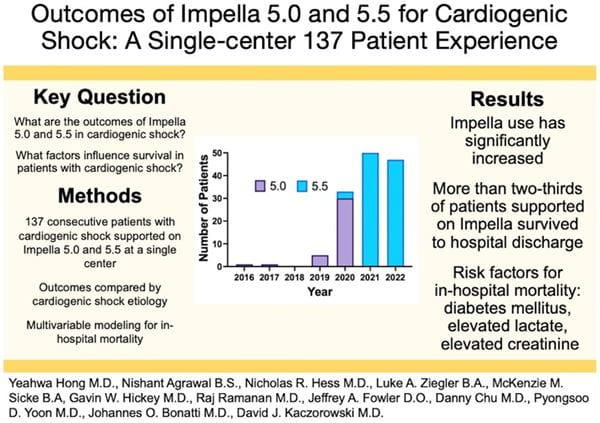Password Reset
Forgot your password? Enter the email address you used to create your account to initiate a password reset.
Forgot your password? Enter the email address you used to create your account to initiate a password reset.
Experts from the UPMC Heart and Vascular Institute and the UPMC Heart Transplant Program recently published new research evaluating the outcomes of patients with cardiogenic shock supported with Impella 5.0 or 5.5® in the Artificial Organs journal.
In this study, researchers aimed to identify predictors of in-hospital mortality and evaluate the outcomes of Impella 5.0 or 5.5 in 137 patients with cardiogenic shock at a single center. Patients were separated into three groups based on their cardiogenic shock etiology: acute myocardial infarction (AMI), acute decompensated heart failure (ADHF), and postcardiotomy (PC).
Conclusion of Findings
The study found that Impella 5.0 and 5.5 can provide effective mechanical circulatory support for patients with cardiogenic shock. Specifically, the results of the study demonstrated that more than two-thirds of patients with cardiogenic shock who were supported on Impella 5.0 or 5.5 survived to hospital discharge. Of these patients, nearly 95% were alive 180 days after discharge. Findings revealed that the etiology of cardiogenic shock did not impact in-hospital mortality.
Diabetes mellitus, elevated pre-insertion serum lactate, and elevated pre-insertion serum creatinine were identified as the most significant risk factors for in-hospital mortality. These findings are important for risk stratification and patient selection when Impella support is being considered. Careful consideration of these risk factors may help improve outcomes in this vulnerable population.
Additional randomized trials are necessary to further assess the role and timing of Impella support in the treatment of cardiogenic shock.

Impella is a registered trademark of Abiomed.
Reference
, Nishant , Nicholas R. , Luke A. , , Gavin W. , Raj Ramanan, Jeffrey A. Fowler, Danny Chu, Pyongsoo D. Yoon, Johannes O. Bonatti, David J. Kaczorowski. Outcomes of Impella 5.0 and 5.5 for cardiogenic shock: A single-center 137 patient experience. Artificial Organs. 2024; 00: 1–10. https://doi.org/10.1111/aor.14735